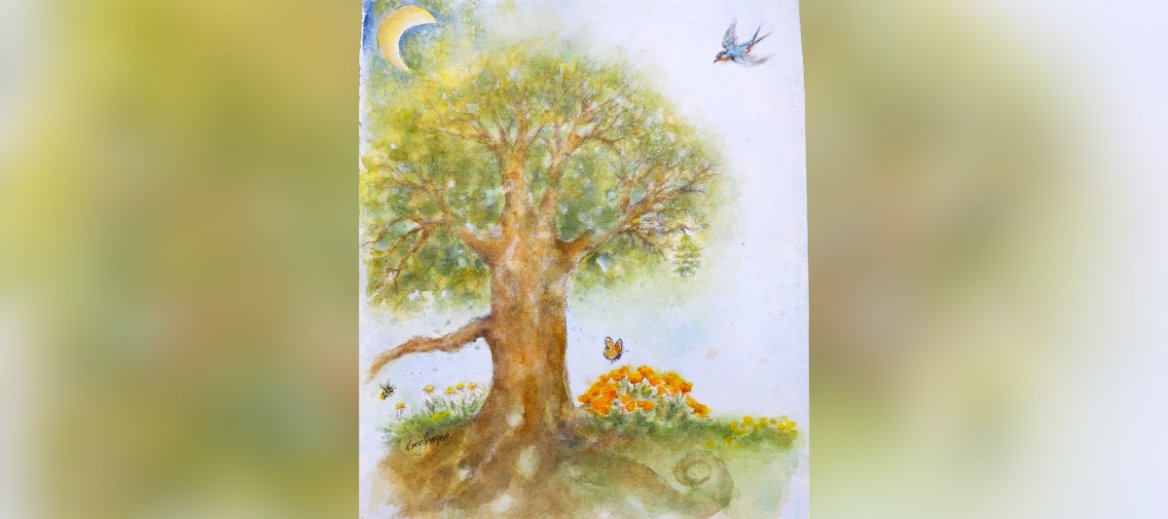By Sarah Hennessey, Franciscan Sister of Perpetual Adoration
One afternoon, as a teenager at summer camp, I looked up and saw the sun hitting a single oak leaf that dangled from a sturdy branch. Suddenly the leaf transformed. My vision expanded, and I could see the sun glistening through its green cells. I felt the leaf connected to the tree, to the sky, to the earth and even to the farthest invisible star. I caught my breath. I was filled with warmth. With words I didn’t yet have, I sensed the interconnectedness of the cosmos and my interwoven place within it. I felt whole.
St. Francis’ Canticle of the Creatures captures our hearts because this prayer-hymn connects to our deepest knowing. This simple song came from Francis’ lifelong conversion, struggles and inherent mystical sense of God’s goodness within all that exists. For Francis, the Canticle was a living expression of all he had experienced. Written near the end of his life, it is a culmination — not of study — but of the grittiness of life.
Two aspects of the Canticle call forth specific challenges in us: the Italian word “per” and creation as family.
The Italian word “per” can be translated into English as “in,” “for” or “through.” However, “per” is most commonly and perhaps most accurately translated as
“through.” This word makes a significant difference. The Canticle is not about the beauty of the sun and moon. As written by St. Francis, it’s the beautiful sun, moon, fire, water, wind and Earth praising God with all their might.
For Francis, creation praises God in a way that humanity cannot. He viewed the elements as closer to God without the fall of original sin and the faults of humankind. Creation not only reflects the goodness of God; rather, all that exists praises God the wholeness, God who is good and overflowing love.
Francis sings this song through Brother Sun. Creation is family. Interwoven and deeply relational, the oak leaf that spoke to my heart was my sister. We are all knit together.
In an age of extreme ecological crisis, the Canticle reveals the world to us as it is and as it should be. We cannot pretend to be removed from the family of creation. Our pretense and actions of domination endanger our very lives and our one planet.
Pope Francis spoke to this reality in his encyclical, Laudato Si’. The title comes from the first words of the Canticle: “Praised be to you my Lord.” Pope Francis
looked to St. Francis as a model who “shows us just how inseparable the bond is between concern for nature, justice for the poor, commitment to society and interior peace.” When we realize this, we act differently.
Laudato Si’ calls us to acknowledge the immensity and urgency of the global climate crisis that we face and to realize the deep interconnectedness of everything
and everyone on planet Earth. In my own life, crisis and interconnectedness lead to concrete steps.
I pledged commitment to the Laudato Si’ Action Platform, a movement that “equips Catholic institutions and individuals to journey together towards total sustainability in the spirit of the encyclical.” The platform helps me develop a personal plan, guiding me to effective action steps and providing progress-tracking tools. My dedication includes reducing my meat consumption by 80%, using glass containers for storing leftovers and buying laundry detergent sheets instead of liquid soap. Through the platform, I become inspired by the changes people all over the world are making.
Eating a plant-based diet, choosing less air travel, biking or driving electric vehicles and increasing energy efficiency in your home can also make a big difference.
And I’ve learned that personal change without advocacy leaves 90% of the problems facing creation unsolved. We need to raise our voices.
Joining FSPA, as we advocate for closing Line 5 in Wisconsin or uniting with Franciscans International on the global level, are important ways we live the Canticle
of the Creatures today.
Ultimately, as a living song, the Canticle requires each of us to write our unique lyrics.
How am I called to praise God with my life? What does the family of creation call forth in me?
St. Francis lived a life of ongoing conversion. His song, written from suffering as well as joy, equips us well for the world today. We are a cosmic family. Through
creation we praise God. Through our daily choices and our Franciscan family, we are not alone. We sing praise to the God of love and goodness!
Image above: Original watercolor painting by Mary Thompson, FSPA affiliate

